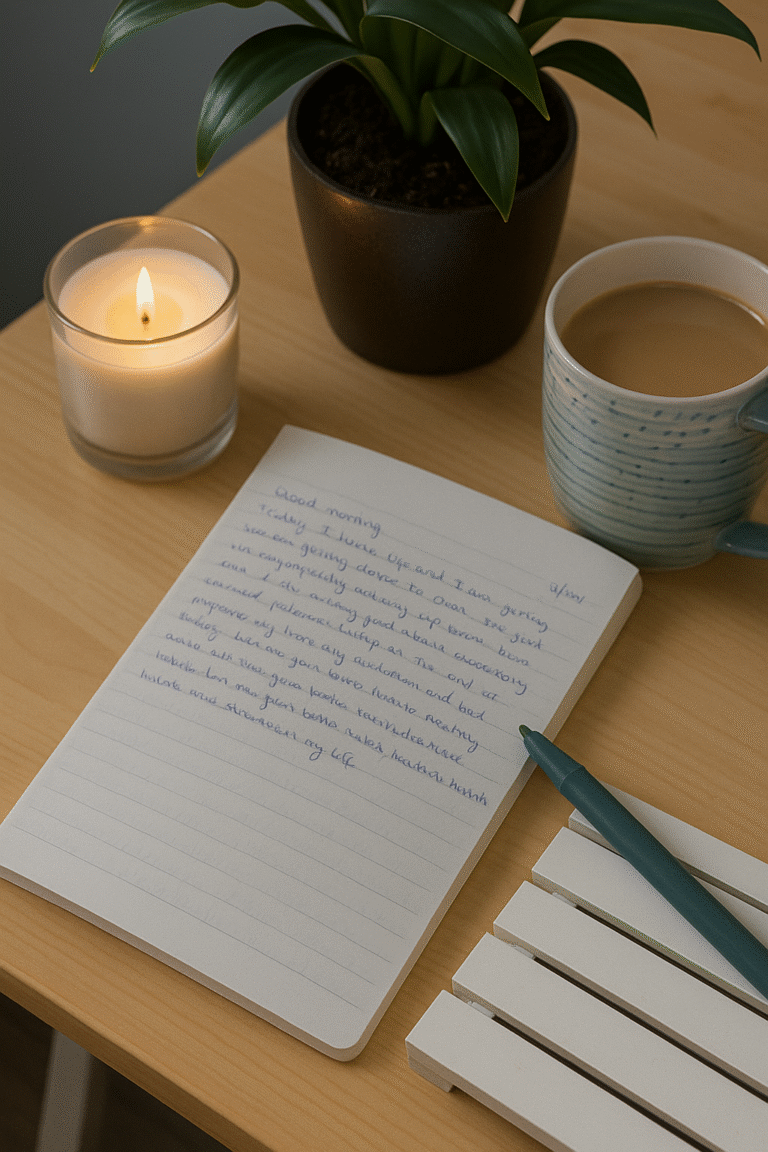Finding Peace in Chaos: How Journaling Benefits Your Mind and Soul
In a world that often feels overwhelming, finding moments of peace can seem like a distant dream. Journaling offers a sanctuary for your thoughts, a place where you can untangle the chaos in your mind and find clarity through writing. By committing your emotions to paper, you engage in emotional processing, allowing your inner voice to be heard and understood. This mindful journaling practice not only fosters self-awareness but also paves the way for personal growth through journaling. Imagine having a retreat that is always available, where you can reflect, celebrate small victories, and confront unspoken feelings; this is the transformative journal experience that awaits you. #ClarityThroughWriting
Writing in a journal can help bring order to our often chaotic thoughts and emotions. This section explores how putting pen to paper can lead to greater mental clarity and a sense of calm.
Organizing Thoughts and Feelings
Journaling provides a structured way to sort through the jumble of ideas and emotions that often cloud our minds. By writing down our thoughts, we can see patterns and connections that might not be apparent when they’re swirling around in our heads.
One effective method is to start with a brain dump, jotting down everything that comes to mind without judgment. This process can help clear mental clutter and make room for more focused thinking.
After the initial dump, try categorizing your thoughts. You might group them by topic, urgency, or emotional impact. This organization can make complex issues feel more manageable and help you prioritize what needs your attention most.
Research shows that regular journaling can improve cognitive function and memory. By consistently writing down your thoughts, you’re essentially training your brain to process information more effectively.
Finding Calm in Chaos
In our fast-paced world, finding moments of peace can be challenging. Journaling offers a way to create a quiet space for reflection, even amidst external chaos.
The act of writing itself can be meditative. As you focus on forming words on the page, your mind naturally slows down. This can help reduce stress and anxiety, allowing you to approach problems with a clearer perspective.
Try setting aside a specific time each day for journaling. This routine can become an anchor, providing stability during turbulent times. Even just 10 minutes of writing can make a significant difference in your mental state.
Studies have shown that journaling can lower blood pressure and improve overall well-being. By creating a regular practice, you’re investing in your long-term mental and physical health.
Emotional Processing
Journaling serves as a powerful tool for understanding and managing our emotions. This section delves into how writing can help us navigate our inner world and create a safe space for self-expression.
Understanding Inner Turmoil
Journaling provides a unique opportunity to explore our deepest emotions without fear of judgment. By writing freely about our feelings, we can gain insights into the root causes of our emotional responses.
Start by describing a situation that triggered strong emotions. Then, dig deeper by asking yourself questions like “Why did I react this way?” or “What past experiences might be influencing my response?” This self-inquiry can lead to valuable self-awareness.
Over time, you may notice patterns in your emotional responses. Recognizing these patterns is the first step towards making positive changes in how you react to challenging situations.
Experts suggest that journaling can be particularly helpful for processing traumatic experiences. It allows us to confront difficult emotions at our own pace, in a controlled environment.
Journaling as a Safe Space
Your journal is a judgment-free zone where you can express yourself without fear of consequences. This safe space can be incredibly liberating, allowing you to explore thoughts and feelings you might not feel comfortable sharing with others.
Consider your journal as a trusted confidant. You can write about your fears, dreams, and secret desires without worrying about how others might perceive them. This freedom of expression can lead to profound self-discovery.
Remember, there’s no “right” way to journal. Your entries can be messy, contradictory, or even nonsensical. The important thing is that you’re giving yourself permission to be authentically you.
Research indicates that expressive writing can have significant health benefits, including improved immune function and reduced symptoms of depression and anxiety.
Personal Growth Through Journaling
Journaling is not just about recording events; it’s a powerful tool for personal development. This section explores how regular writing can enhance self-awareness and help you celebrate your progress.
Self-Awareness Practices
Self-awareness is the foundation of personal growth, and journaling is an excellent way to cultivate it. By regularly reflecting on your thoughts, actions, and emotions, you can gain valuable insights into your patterns and behaviors.
Try incorporating specific self-awareness exercises into your journaling routine. For example, you might write about your core values and how well your actions align with them. Or, you could reflect on a recent conflict and explore your role in it.
Another effective practice is to write about your goals and the steps you’re taking to achieve them. This can help you stay accountable and track your progress over time.
Studies show that increased self-awareness can lead to better decision-making and improved relationships. By making self-reflection a habit through journaling, you’re investing in your overall well-being.
Celebrating Small Victories
In our pursuit of big goals, we often overlook the small wins along the way. Journaling provides a space to acknowledge and celebrate these minor achievements, boosting motivation and self-esteem.
Make it a habit to write down at least one thing you’re proud of each day, no matter how small. It could be as simple as making your bed or completing a task you’ve been putting off. Over time, you’ll build a record of your progress and resilience.
Reviewing past entries can be incredibly empowering. It allows you to see how far you’ve come and can provide encouragement during challenging times.
Research suggests that focusing on positive experiences can improve overall mood and increase life satisfaction. By regularly celebrating your small victories in your journal, you’re training your brain to notice and appreciate the good in your life.



